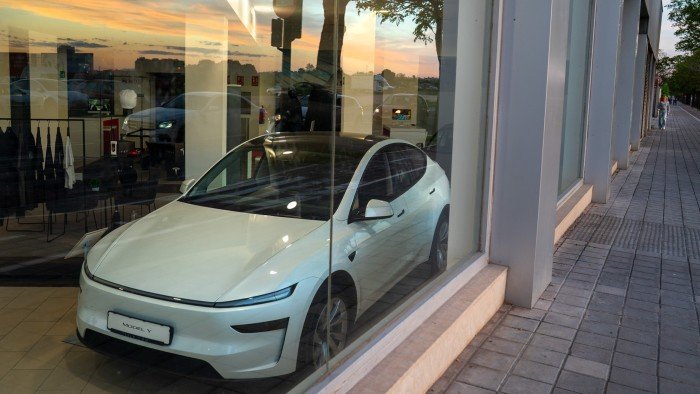Unlock the Editor’s Digest for free
Roula Khalaf, Editor of the FT, selects her favourite stories in this weekly newsletter.
Tesla’s deliveries fell for a second straight quarter as the electric-vehicle maker contends with slumping demand in Europe and rising competition from western and Chinese rivals.
The company, led by Elon Musk, delivered 384,122 vehicles in the three months to the end of June, below the 389,000 forecast by analysts and down 13 per cent from 443,956 in the same period last year.
Still, the second-quarter figure was an improvement from the first three months of the year when the company delivered 336,681 cars — its worst quarter since 2022.
“Tesla’s sales were affected by weaker demand in Europe and Elon’s polarising politics, among other reasons,” said Cantor Fitzgerald analyst Andres Sheppard.
As well as new and more affordable models from China’s BYD and European rivals including Renault and Stellantis, Tesla is grappling with a consumer backlash triggered by Musk’s political activism.
Nevertheless, “deliveries were better than feared”, said William Blair analyst Jed Dorsheimer. Tesla shares traded up 4 per cent on Wednesday, although they are down 22 per this year.
In May, the Tesla chief quit his role in Donald Trump’s administration, where he had led the so-called Department of Government Efficiency (Doge).
While Musk had pledged to reduce his political activity and allocate “far more of my time to Tesla”, this week he vowed to start a new political party to oppose Trump after falling out with the president over his “Big Beautiful Bill”.
In response the president said Doge could cut subsidies to Tesla and SpaceX and said he would “take a look” at deporting Musk to his native South Africa.
With Musk appearing to renege on his promise to focus on his businesses, “[we] would prefer effort to be channelled towards the robotaxi rollout at this critical juncture”, said Dorsheimer, who warned that “we only see downside from these [political] actions”.
Tesla recently released an upgraded version of its flagship Model Y SUV in an effort to reboot demand, while Musk touted the launch of its self-driving robotaxi service in Austin as a potential source of growth.
The rollout of the robotaxis was limited in scale with a Tesla employee seated in the passenger side for safety. But Musk claimed there would be 1,000 robotaxis “in a few months”, and that the service would expand to cities such as San Francisco and Los Angeles.
While the revamped Model Y helped drive a rebound in sales in Norway and Spain in June, registrations of Tesla vehicles fell 28 per cent in Europe and the UK in May, according to European car industry body ACEA.
Meanwhile, Chinese rival BYD charged ahead in the second quarter, delivering 606,993 electric cars, up 42 per cent from the same period last year.
While Tesla did not give a geographical breakdown of the deliveries, analysts pointed to signs of a sales recovery in China for the month of June.
“If Musk continues to lead and remain in the driver’s seat, we believe Tesla is on a path to an accelerated growth path over the coming years,” Wedbush analyst Daniel Ives said, predicting that deliveries will pick up in the latter half of the year on the new Model Y demand.
Tesla will report its full second-quarter earnings on July 23.
Additional reporting by Gloria Li in Hong Kong


